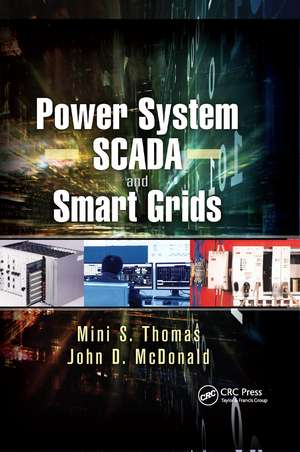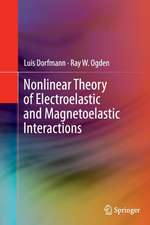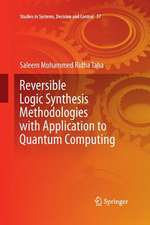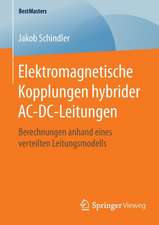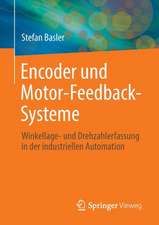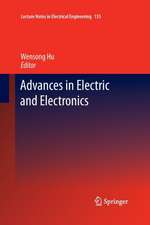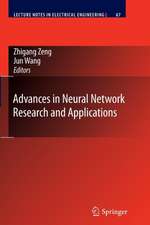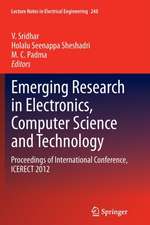Power System SCADA and Smart Grids
Autor Mini S. Thomas, John Douglas McDonalden Limba Engleză Paperback – 30 sep 2020
Power System SCADA and Smart Grids brings together in one concise volume the fundamentals and possible application functions of power system supervisory control and data acquisition (SCADA). The text begins by providing an overview of SCADA systems, evolution, and use in power systems and the data acquisition process. It then describes the components of SCADA systems, from the legacy remote terminal units (RTUs) to the latest intelligent electronic devices (IEDs), data concentrators, and master stations, as well as:
- Examines the building and practical implementation of different SCADA systems
- Offers a comprehensive discussion of the data communication, protocols, and media usage
- Covers substation automation (SA), which forms the basis for transmission, distribution, and customer automation
- Addresses distribution automation and distribution management systems (DA/DMS) and energy management systems (EMS) for transmission control centers
- Discusses smart distribution, smart transmission, and smart grid solutions such as smart homes with home energy management systems (HEMs), plugged hybrid electric vehicles, and more
Power System SCADA and Smart Grids is designed to assist electrical engineering students, researchers, and practitioners alike in acquiring a solid understanding of SCADA systems and application functions in generation, transmission, and distribution systems, which are evolving day by day, to help them adapt to new challenges effortlessly. The book reveals the inner secrets of SCADA systems, unveils the potential of the smart grid, and inspires more minds to get involved in the development process.
| Toate formatele și edițiile | Preț | Express |
|---|---|---|
| Paperback (1) | 437.89 lei 6-8 săpt. | |
| CRC Press – 30 sep 2020 | 437.89 lei 6-8 săpt. | |
| Hardback (1) | 789.22 lei 6-8 săpt. | |
| CRC Press – 13 apr 2015 | 789.22 lei 6-8 săpt. |
Preț: 437.89 lei
Nou
Puncte Express: 657
Preț estimativ în valută:
83.79€ • 88.11$ • 69.24£
83.79€ • 88.11$ • 69.24£
Carte tipărită la comandă
Livrare economică 17 aprilie-01 mai
Preluare comenzi: 021 569.72.76
Specificații
ISBN-13: 9780367658847
ISBN-10: 0367658844
Pagini: 352
Dimensiuni: 156 x 234 x 19 mm
Greutate: 0.49 kg
Ediția:1
Editura: CRC Press
Colecția CRC Press
ISBN-10: 0367658844
Pagini: 352
Dimensiuni: 156 x 234 x 19 mm
Greutate: 0.49 kg
Ediția:1
Editura: CRC Press
Colecția CRC Press
Public țintă
Academic and PostgraduateCuprins
Power System Automation. SCADA Fundamentals. SCADA Communication. Substation Automation (SA). Energy Management Systems (EMS) for Control Centers. Distribution Automation and Distribution Management (DA/DMS) Systems. Smart Grid Concepts.
Notă biografică
Mini S. Thomas is a professor in the Department of Electrical Engineering at Jamia Millia Islamia, New Delhi, India (JMI), with 29 years of teaching and research experience in the field of power systems. She was the head of the Department of Electrical Engineering and currently is the director of the Center for Innovation and Entrepreneurship. She graduated from the University of Kerala, India and obtained her M.Tech from the Indian Institute of Technology Madras, both with Gold Medals. She also holds a Ph.D from the Indian Institute of Technology Delhi, New Delhi. Dr. Thomas conceived, designed, and implemented the first-of-their-kind supervisory control and data acquisition (SCADA) and substation automation (SA) laboratories and has done extensive research work in SCADA systems, substation and distribution automation, and smart grids. She has published more than 100 research papers in international journals and conferences of repute, and is the coordinator of the special assistance program (SAP) on power system automation from the University Grants Commission, Government of India.
John D. McDonald, P.E., is director of Technical Strategy and Policy Development for GE Energy Management - Digital Energy, Atlanta, Georgia, USA, with 40 years of experience in the electric utility industry. He joined GE Energy’s Transmission and Distribution (now Digital Energy) business in 2008 as general manager of marketing, and accepted his current role in 2010. McDonald is a sought-after industry leader, technical expert, educator, and speaker. In his 28 years of working group and subcommittee leadership with the IEEE Power and Energy Society (PES) Substations Committee, he led seven working groups and task forces that published standards and tutorials in the areas of SCADA and master/remote terminal unit (RTU) and RTU/IED communications protocols. He is a fellow of IEEE and past president of the IEEE PES. He teaches smart grid courses for GE and the Georgia Institute of Technology, Atlanta, USA, and substation automation, SCADA, and communications courses for various IEEE PES local chapters. He has published 80 papers and articles, co-authored four books, and holds a BSEE and MSEE from Purdue University, West Lafayette, Indiana, USA, and an MBA from the University of California-Berkeley, USA. He received the 2009 Outstanding Electrical and Computer Engineer Award from Purdue University.
John D. McDonald, P.E., is director of Technical Strategy and Policy Development for GE Energy Management - Digital Energy, Atlanta, Georgia, USA, with 40 years of experience in the electric utility industry. He joined GE Energy’s Transmission and Distribution (now Digital Energy) business in 2008 as general manager of marketing, and accepted his current role in 2010. McDonald is a sought-after industry leader, technical expert, educator, and speaker. In his 28 years of working group and subcommittee leadership with the IEEE Power and Energy Society (PES) Substations Committee, he led seven working groups and task forces that published standards and tutorials in the areas of SCADA and master/remote terminal unit (RTU) and RTU/IED communications protocols. He is a fellow of IEEE and past president of the IEEE PES. He teaches smart grid courses for GE and the Georgia Institute of Technology, Atlanta, USA, and substation automation, SCADA, and communications courses for various IEEE PES local chapters. He has published 80 papers and articles, co-authored four books, and holds a BSEE and MSEE from Purdue University, West Lafayette, Indiana, USA, and an MBA from the University of California-Berkeley, USA. He received the 2009 Outstanding Electrical and Computer Engineer Award from Purdue University.
Recenzii
"... a must-have text on this subject. It provides not only students, but those who deal with SCADA, insight into the various technologies and systems that exist along with their differences—both strengths and weaknesses. ... a very thoughtful resource on such an important, and rapidly changing, topic. This book also provides the next generation of power engineers with a ready reference to understand where we have been and where we can go in the not-too-distant future."
—David W. Roop, from IEEE Power and Energy Magazine, January/February 2016
"As a power system operator having nearly four decades of experience and as an end user of the supervisory control and data acquisition (SCADA) systems, I have always found the available literature on SCADA as limited and in the form of documents by vendors or in the form of research papers. This book is a first of its kind in the sense that it is ‘vendor neutral’ and very lucidly brings out various fundamental concepts related to SCADA. The book provides an excellent reference material both for beginners and practicing professionals. I would strongly recommend the book to all power system engineers as an essential reference material. … It provides an understanding of the historical and legacy systems as well as an insight into the new technologies. Automation is the key to the future, and the book appropriately delves into this aspect."
—Sushil Kumar Soonee, Power System Operation Corporation, New Delhi, India
"The authors cover all of the building blocks and detailed functionality of electric power SCADA systems, including a good deal of legacy hardware and older techniques. This is important because most large existing systems contain a mix of new and old equipment, with the latter being very poorly documented and therefore hard for newcomers in the field to understand. I would recommend this book to college students/new graduates as well as professionals coming from other industri
—David W. Roop, from IEEE Power and Energy Magazine, January/February 2016
"As a power system operator having nearly four decades of experience and as an end user of the supervisory control and data acquisition (SCADA) systems, I have always found the available literature on SCADA as limited and in the form of documents by vendors or in the form of research papers. This book is a first of its kind in the sense that it is ‘vendor neutral’ and very lucidly brings out various fundamental concepts related to SCADA. The book provides an excellent reference material both for beginners and practicing professionals. I would strongly recommend the book to all power system engineers as an essential reference material. … It provides an understanding of the historical and legacy systems as well as an insight into the new technologies. Automation is the key to the future, and the book appropriately delves into this aspect."
—Sushil Kumar Soonee, Power System Operation Corporation, New Delhi, India
"The authors cover all of the building blocks and detailed functionality of electric power SCADA systems, including a good deal of legacy hardware and older techniques. This is important because most large existing systems contain a mix of new and old equipment, with the latter being very poorly documented and therefore hard for newcomers in the field to understand. I would recommend this book to college students/new graduates as well as professionals coming from other industri
Descriere
This book brings together the fundamentals and possible application functions of power system supervisory control and data acquisition (SCADA). It assists electrical engineering students, researchers, and practitioners in acquiring a solid understanding of SCADA systems and application functions in generation, transmission, and distribution syst
